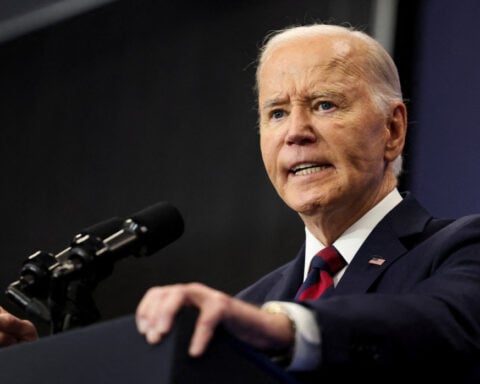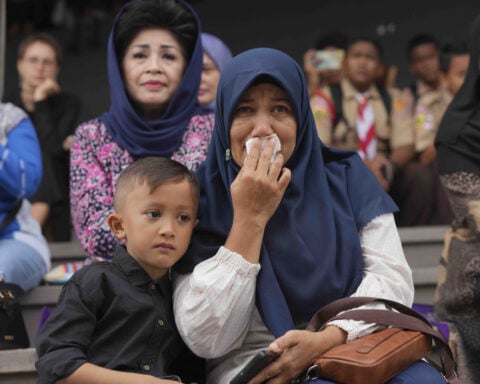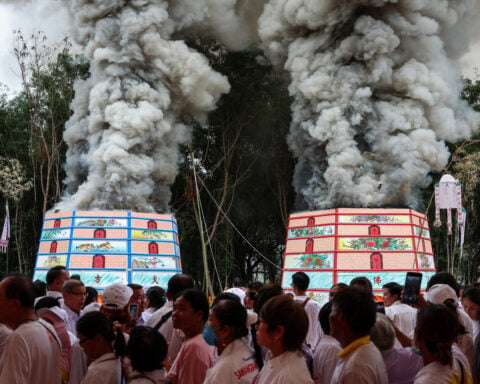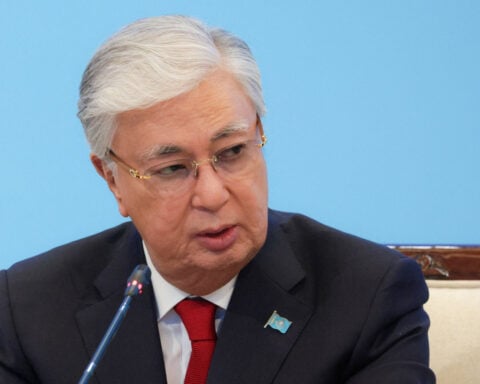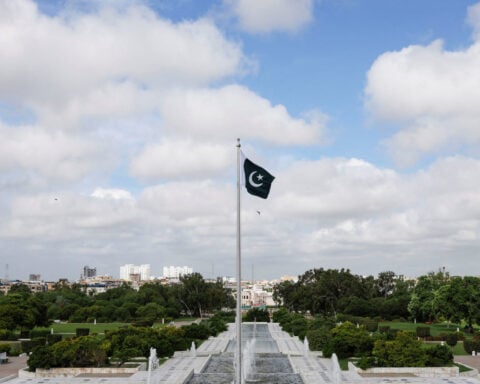Paris (CNN) — “We have your location. We will share it for the highest bidder,” one wrote to her.
“I will cut your head off.”
“Where do you want me to rape you?” another message read.
More than 5,000 calls and messages bombarded Marzieh Hamidi’s phone in the days after the Afghan Taekwondo champion dared to suggest that her home country’s men’s cricket team didn’t represent her – an athlete forced into exile by the Taliban’s ban on women’s sport.
“Taekwondo gives me more identity as a woman,” she told CNN, “to feel more powerful in society.”
Hounded by death threats in Paris, where the 21-year-old refugee now lives under police protection, Hamidi has become a champion for equal rights for Afghan women. It’s a campaign waged disproportionately by the country’s female athletes.
“In Afghanistan, women are not allowed to be women,” she added. “They do not exist.”
Her countrywoman Manizha Talash was disqualified from this year’s Paris Olympics after unveiling a cape with the message “Free Afghan Women” during the breakdancing events.
She was removed from the competition for making a “political protest.”
“With these three words I spoke with all the world and asked them, please, let’s do some practical action for Afghan women. We don’t want anything special from this world. We just want fundamental human rights,” Manizha told CNN.
Sprinter Kimia Yousofi, the country’s flagbearer for the Tokyo Games in 2021, escaped a similar ban after unveiling a hand-scrawled note after a sprint heat: “Education, Sport, Our Rights.”
While Afghan men’s teams are largely free to compete internationally, the country’s women are barred from sport, forced to compete without official backing or into exile to represent refugee teams.
Treated like a foreigner
Hamidi told CNN how she came face to face with the Afghan men’s team while competing as a refugee at the Taekwondo world championships in Azerbaijan last year.
Banned from representing her home country, she said she was treated like a foreigner by her former teammates.
“They are the Taliban team for me, not the Afghan team,” she said, a similar accusation she has leveled against the Afghan cricket team, calling for Afghan sports teams to be banned from the Olympics, following bans on South Africa during the apartheid era.
“At the same time they are coming (to international competitions), the Taliban are killing many women in Afghanistan,” she said.
CNN has reached out to the Afghanistan Cricket Board and the country’s Taekwondo federation for comment.
It comes as the Taliban “eviscerated the rights of women and girls in the name of Islam,” according to Richard Bennett, UN Special Rapporteur for human rights in Afghanistan.
“They have removed or, created a situation where women and girls, are unable to participate as full human beings in the society,” he said, while a recent law, “institutionalized this state of discrimination, segregation, exclusion, and denial of human dignity for women and girls.”
It was this stark gulf in women’s rights – what Hamidi and others refer to as gender apartheid – that pushed her to call attention to the suffering of her countrywomen with the hashtag #LetUsExist.
An apartheid is a crime against humanity but currently only on the grounds of race, not on the basis of sex and gender, Bennett said. The term gender apartheid was first used by Afghan women in the late 1990s during the first Taliban regime.
Just not cricket
Despite the horrific situation for women in Afghanistan, Afghan male teams, like the hugely popular cricket side, are able to compete on the international stage.
Cricket is widely followed in Afghanistan, and the country’s national team – whose emblem still displays the tricolor flag of the government ousted by the Taliban – has been a source of national pride for many, even though the Taliban has barred women from playing cricket.
Hamidi told CNN the Afghan men’s cricket team is “not representing the women of Afghanistan.”
In an interview this summer, it was comments like these, accusing Afghanistan’s male cricketers of “normalizing” the Taliban, which sparked a pyre of online hate.
Female sporting stars have been easy targets for Taliban sympathizers, especially for those among the country’s diaspora.
Aside from her political opinions, “they are criticizing Marzieh Hamidi for being a woman, for speaking in public and for dressing in a, let’s say, Western way,” Hamidi’s lawyer Ines Davau told CNN.
The threat has evolved since the Taliban’s repression against women in the 1990s.
“The Taliban, who are now in power in Afghanistan, are very tech savvy, much more media savvy,” the UN’s Bennett said.
After arriving in France following the fall of the Afghan government in 2021, she’s had to build a new life, shadowed by fears for her family and Taliban reprisals for her defiance against their chokehold on the rights of Afghan women.
On Instagram, and in person, she radiates a defiant thirst for life and her dreams of becoming an Olympian.
But relentlessly harassed by threats of murder and rape, Hamidi now lives under constant police protection. Taliban sympathizers have stolen any semblance of a normal life from her.
“They have quite a sophisticated public relations and possibly surveillance system that could penetrate countries abroad as well,” the UN’s Bennett added. “If there are no consequences, if there is no pushback on this, misogynists everywhere will take note.”
Ongoing hate
Weeks after the first threats, Hamidi still receives terrifying messages.
One in early October came from an Instagram user: “I only have 3 months left until my money is ready, then I can go directly to Paris and there I will cut your head off.”
The calls and messages Hamidi has received have come from numbers across Europe, with many written in English.
Davau, Hamidi’s lawyer, is looking to show the coordination behind this campaign of hate.
The Paris prosecutor’s office confirmed to CNN that an investigation has been launched into the threats, led by France’s specialist agency for hate crime and crimes against humanity.
“There’s really a call to go on her Instagram profile to insult her, intimidate her, threaten her,” Davua told CNN.
While many overtly threaten violence against the young athlete, others appear innocuous: gifs of Afghan cricketers, left without comment on many of Hamidi’s posts, seemingly with no relevance to the post’s content.
“Participation in harassment can actually be quite small,” Davau said, “knowingly accepting (to join) an action that harms someone’s health is harassment under French law.”
When she first received the threats, Hamidi said it was like being back in Kabul. But despite the threats, alone in France, she shows no sign of letting up the fight.
“They want to make us invisible in Afghanistan,” she said. “I want to show them that we are strong.”
The-CNN-Wire
™ & © 2024 Cable News Network, Inc., a Warner Bros. Discovery Company. All rights reserved.

 How to save a fentanyl victim: Key facts about naloxone
How to save a fentanyl victim: Key facts about naloxone
 Eight convicted in France over murder of teacher who showed Prophet caricature
Eight convicted in France over murder of teacher who showed Prophet caricature
 Death toll from German Christmas market car-ramming rises to four, Bild reports
Death toll from German Christmas market car-ramming rises to four, Bild reports
 France's Mayotte struggles to recover as cyclone overwhelms hospitals
France's Mayotte struggles to recover as cyclone overwhelms hospitals
 Russia's UK embassy denounces G7 loans to Ukraine as 'fraudulent scheme'
Russia's UK embassy denounces G7 loans to Ukraine as 'fraudulent scheme'
 Pope calls Gaza airstrikes 'cruelty' after Israeli minister's criticism
Pope calls Gaza airstrikes 'cruelty' after Israeli minister's criticism
 Retailer Party City files for bankruptcy, will wind down 700 stores
Retailer Party City files for bankruptcy, will wind down 700 stores
 Soccer's top players have had enough, as FIFA's new super-sized tournament sparks a revolt
Soccer's top players have had enough, as FIFA's new super-sized tournament sparks a revolt
 Lindsey Vonn finishes 14th in a super-G to mark her return to World Cup skiing at age 40
Lindsey Vonn finishes 14th in a super-G to mark her return to World Cup skiing at age 40
 Santa and Mrs. Claus use military transports to bring Christmas to an Alaska Native village
Santa and Mrs. Claus use military transports to bring Christmas to an Alaska Native village
 Li-Lian Ahlskog Hou/CNN via CNN Newsource
Li-Lian Ahlskog Hou/CNN via CNN Newsource
